At Il Cinema Ritrovato, a highlight in the programme section Augusto Genina: an Italian in Europe is the highly acclaimed drama Maddalena/Magdalene (Augusto Genina, 1954).
The title role is performed by Marta Toren (1926–1957), a Swedish-American stage and film actress of the 1940s and 1950s with mesmerising eyes. During her tragically short career, she spent more time in Hollywood and Italy than in her native country.
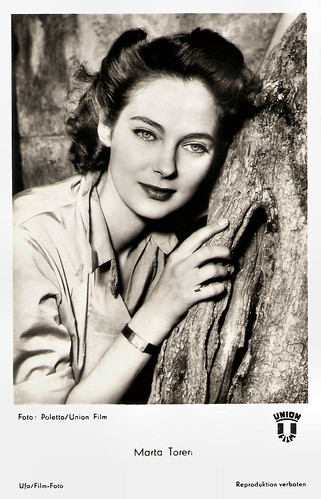
German postcard by Ufa, Berlin-Tempelhof, no FK 1079. Photo: Poletto / Union-Film. Publicity still for Maddalena (Augusto Gennina, 1954).
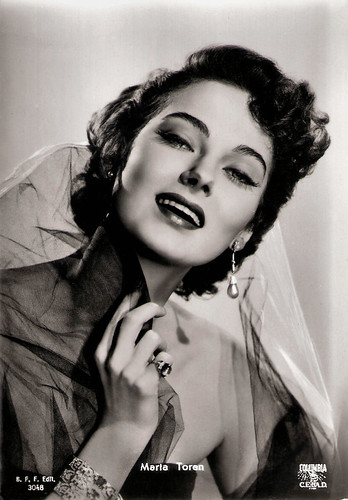
Italian postcard by B.F.F. Edit., no. 3048. Photo: Columbia CEAD.
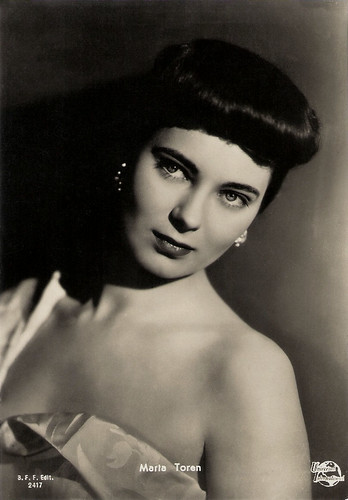
Italian postcard by B.F.F. Edit. (Casa Editr. Ballerini & Fratini), Firenze (Florence), no. 2417. Photo: Universal International.
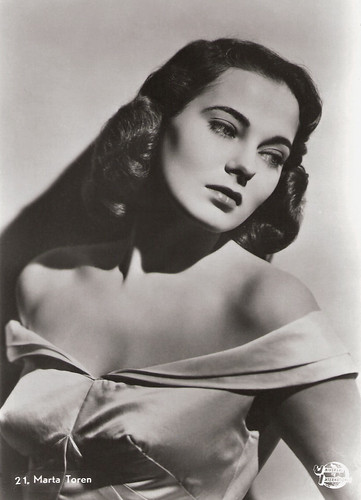
Norvegian postcard by Enerett K. Harstad, Kunstforlag, Oslo, no. 21. Photo: Universal International.
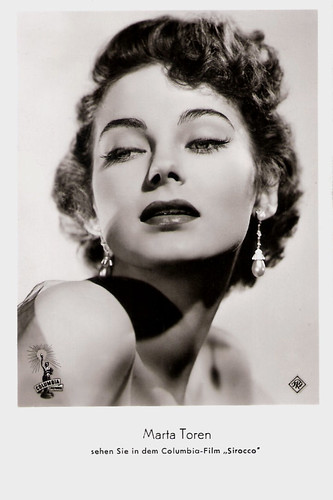
German postcard by F.J. Rüdel, Filmpostkartenverlag, Hamburg-Bergedorf, no. 431. Photo: Columbia. Publicity still for Sirocco (Curtis Bernhardt, 1951).
Märta Torén was born in Stockholm, Sweden in 1926. Her father was Helge Toren, a major in the Life Guards regiment and, later, advertising manager for one of the daily newspapers. Her childhood was unremarkable although marred by the loss of her sister at an early age and the divorce of her parents.
The sensitive young girl dreamed to become an actress, but she was shy. She began ballet lessons under the renowned Vera Alexandrova. The lessons continued until age 14 and helped her to partly overcome her shyness.
She was an extra in the Swedish films Rospiggar (Schamyl Bauman, 1942), Ombyte av tåg/A Change of Trains (Hasse Ekman, 1943) and Eviga länkar/Eternal links (Rune Carlsten, 1946).
In 1946, her application to study acting at Dramatens elevskola (The Royal Dramatic Theater school) was accepted. She became a dedicated student under Anna Norris, a teacher who had also coached Ingrid Bergman.
After only one year, she already left her studies when she met American screen writer and talent scout Edwin Blum who was in Stockholm working on a script for RKO and looking for a leading lady. He arranged a screen test for her and not RKO but Universal-International offered her a seven-year contract.
Universal promoted her as the ‘next Ingrid Bergman’. As Marta Toren, she made her Hollywood debut in a supporting part in Casbah (John Farrow, 1948) about the downfall of an exiled jewel thief (Tony Martin). The film was a musical remake of the French classic Pépé le Moko (Julien Duvivier, 1937) starring Jean Gabin.
Reviewer B.J. at IMDb writes: “Casbah is a film very alive with energy, style, suspense and romance. Brilliant casting; Tony Martin plays the suave thief with easy conviction and delivers the Harold Arlen songs skill, charm and gusto. Marta Toren was arguably the most beautiful woman in films, prior to the arrival of Audrey Hepburn.”
Publicity pictures focused on her beautiful eyes, which had a luminous quality with color shifting from blue to gray to greenish hues and had a fairly slight slant, giving them a faintly Oriental look. The emphasis on her eyes reached a peak with a Life magazine cover portrait in 1949 that graphically confirmed what all the hype was about.
Toren quickly appeared in a total of ten Hollywood movies. She appeared opposite James Mason in the film noir One Way Street (Hugo Fregonese, 1950), and opposite Humphrey Bogart in the Casablanca style Sirocco (Curtis Bernhardt, 1951) set in Syria, but most of her other Hollywood films are not worth remembering.
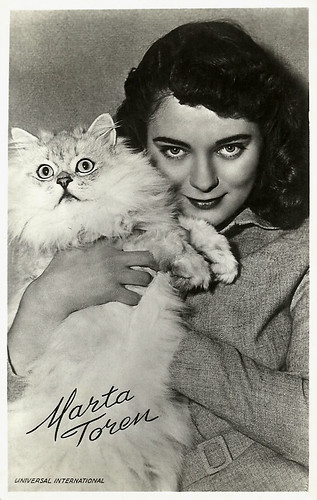
Dutch postcard by Takken, Utrecht. Photo: Universal International.
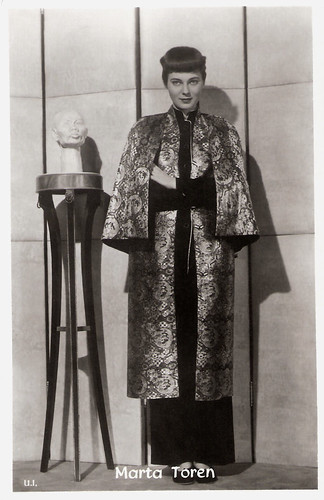
Vintage card. Photo: Universal International.
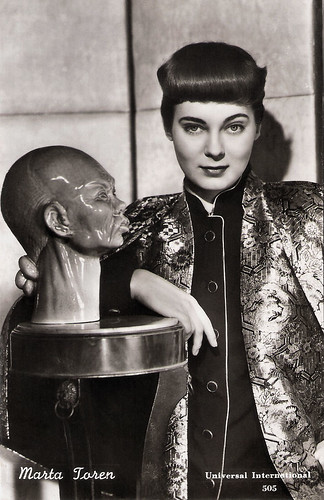
Vintage postcard, no. 505. Photo: Universal International.
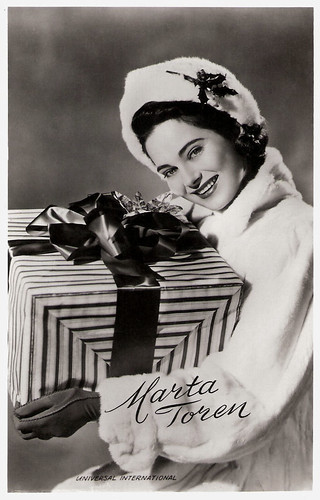
Dutch postcard, no 3374. Photo: Universal International.
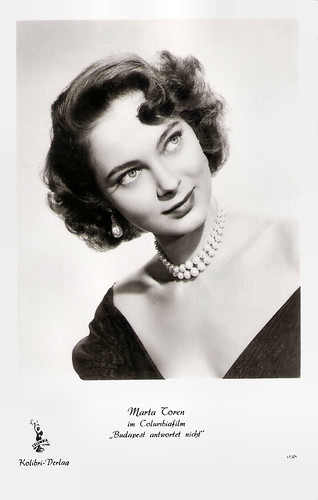
German postcard by Kolibri-Verlag, no 936. Photo: Columbia. Publicity still for Assignment: Paris (Robert Parrish, 1952).
In 1952 Märta Torén became a naturalized American citizen and she got married to American director and film writer Leonardo Bercovici. They would have a daughter, Christina.
She also got offers for film parts from Rome, and these roles were more demanding than what Hollywood offered her. So the family settled in Rome. There she played the wife of composer Giacomo Puccini (Gabriele Ferzetti) in the biopic Puccini/The Life of Puccini (Carmine Gallone, 1953).
She won awards for the highly acclaimed drama Maddalena/Magdalene (Augusto Genina, 1954) with Gino Cervi. In La vena d'oro/The Golden Vein (Mauro Bolognini, 1955) she played a young stepmother in an oedipal relationship with her only son (played by the then 16-year-old Mario Girotti aka Terence Hill).
Then her husband directed her in Tormento d'amore/Torment of Love (Leonardo Bercovici, Claudio Gora, 1956) with Massimo Serato.
In late 1956, on a trip to Stockholm an actor approached her with an offer to replace leading lady Eva Henning in a current play by J.B. Priestly, Mr. Kettle and Mrs. Moon. The thought of performing before a hometown audience reportedly was as frightening as it was appealing to Toren.
Ingrid Bergman and other theater friends warned her about the hostile reception she was likely to encounter in her hometown but her debut performance instead got a warm reception from both audiences and critics. In February 1957 she appeared again on stage in Mr. Kettle and Mrs. Moon at Stockholm's Alléteatern (Allee Theatre).
After a performance she suddenly fainted before the door of her dressing room. In the hospital doctors diagnosed that she was stricken with a brain hemorrhage. Her husband rushed to the hospital while their daughter was in London, where Marta planned to do film work after her stage appearance. Tragically, she died two days later in the Stockholm hospital. Märta Torén was only 31.
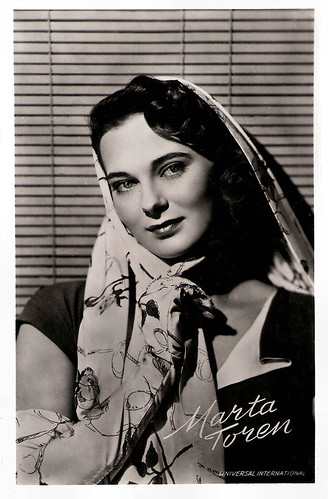
Dutch postcard, no. AX 197. Photo: Universal International.
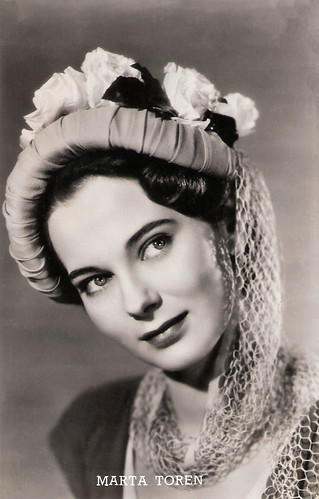
Dutch postcard by Van Leer's Fotodrukindustrie, Amsterdam, no. 1250. Photo: Universal International.
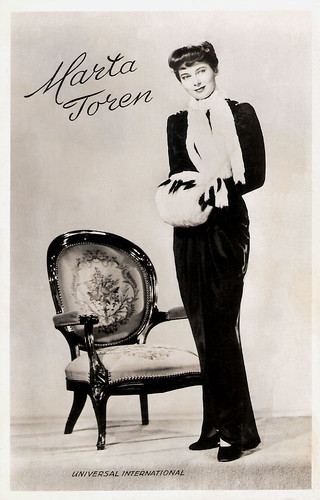
Dutch postcard, no. 3226. Photo: Universal International.
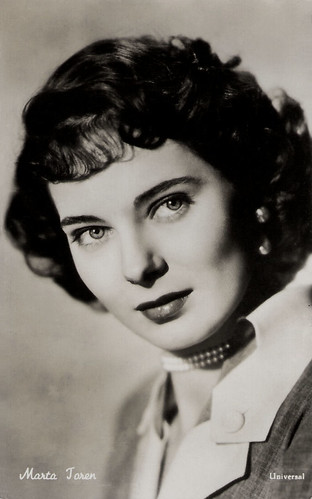
Vintage card. Photo: Universal International.
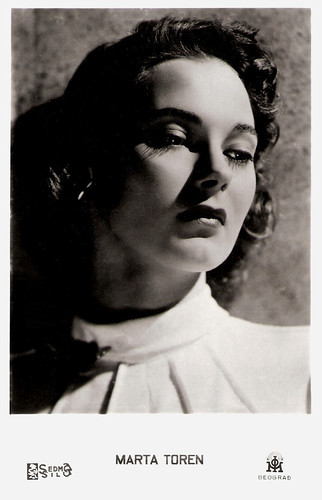
Yugoslavian postcard by Zebranjena. Photo: Sedmo Silo/IOM, Beograd (Belgrado).
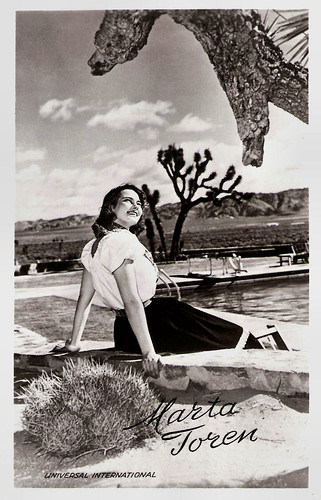
Dutch postcard by Uitgeverij Takken, no. 3225. Photo: Universal International.

Italian postcard by Rotalfoto, Milano, no. 577. Photo: publicity still for La puerta abierta/The Open Door (César Fernández Ardavín, 1957).
Sources: Céline Colassin (CinéArtistes - French), Hal Erickson (AllMovie), Mattias Thuresson (IMDb), Glamour Girls of the Silver Screen, Wikipedia and IMDb.
The title role is performed by Marta Toren (1926–1957), a Swedish-American stage and film actress of the 1940s and 1950s with mesmerising eyes. During her tragically short career, she spent more time in Hollywood and Italy than in her native country.

German postcard by Ufa, Berlin-Tempelhof, no FK 1079. Photo: Poletto / Union-Film. Publicity still for Maddalena (Augusto Gennina, 1954).

Italian postcard by B.F.F. Edit., no. 3048. Photo: Columbia CEAD.

Italian postcard by B.F.F. Edit. (Casa Editr. Ballerini & Fratini), Firenze (Florence), no. 2417. Photo: Universal International.

Norvegian postcard by Enerett K. Harstad, Kunstforlag, Oslo, no. 21. Photo: Universal International.

German postcard by F.J. Rüdel, Filmpostkartenverlag, Hamburg-Bergedorf, no. 431. Photo: Columbia. Publicity still for Sirocco (Curtis Bernhardt, 1951).
The Next Ingrid Bergman
Märta Torén was born in Stockholm, Sweden in 1926. Her father was Helge Toren, a major in the Life Guards regiment and, later, advertising manager for one of the daily newspapers. Her childhood was unremarkable although marred by the loss of her sister at an early age and the divorce of her parents.
The sensitive young girl dreamed to become an actress, but she was shy. She began ballet lessons under the renowned Vera Alexandrova. The lessons continued until age 14 and helped her to partly overcome her shyness.
She was an extra in the Swedish films Rospiggar (Schamyl Bauman, 1942), Ombyte av tåg/A Change of Trains (Hasse Ekman, 1943) and Eviga länkar/Eternal links (Rune Carlsten, 1946).
In 1946, her application to study acting at Dramatens elevskola (The Royal Dramatic Theater school) was accepted. She became a dedicated student under Anna Norris, a teacher who had also coached Ingrid Bergman.
After only one year, she already left her studies when she met American screen writer and talent scout Edwin Blum who was in Stockholm working on a script for RKO and looking for a leading lady. He arranged a screen test for her and not RKO but Universal-International offered her a seven-year contract.
Universal promoted her as the ‘next Ingrid Bergman’. As Marta Toren, she made her Hollywood debut in a supporting part in Casbah (John Farrow, 1948) about the downfall of an exiled jewel thief (Tony Martin). The film was a musical remake of the French classic Pépé le Moko (Julien Duvivier, 1937) starring Jean Gabin.
Reviewer B.J. at IMDb writes: “Casbah is a film very alive with energy, style, suspense and romance. Brilliant casting; Tony Martin plays the suave thief with easy conviction and delivers the Harold Arlen songs skill, charm and gusto. Marta Toren was arguably the most beautiful woman in films, prior to the arrival of Audrey Hepburn.”
Publicity pictures focused on her beautiful eyes, which had a luminous quality with color shifting from blue to gray to greenish hues and had a fairly slight slant, giving them a faintly Oriental look. The emphasis on her eyes reached a peak with a Life magazine cover portrait in 1949 that graphically confirmed what all the hype was about.
Toren quickly appeared in a total of ten Hollywood movies. She appeared opposite James Mason in the film noir One Way Street (Hugo Fregonese, 1950), and opposite Humphrey Bogart in the Casablanca style Sirocco (Curtis Bernhardt, 1951) set in Syria, but most of her other Hollywood films are not worth remembering.

Dutch postcard by Takken, Utrecht. Photo: Universal International.

Vintage card. Photo: Universal International.

Vintage postcard, no. 505. Photo: Universal International.

Dutch postcard, no 3374. Photo: Universal International.

German postcard by Kolibri-Verlag, no 936. Photo: Columbia. Publicity still for Assignment: Paris (Robert Parrish, 1952).
Oedipal Relationship
In 1952 Märta Torén became a naturalized American citizen and she got married to American director and film writer Leonardo Bercovici. They would have a daughter, Christina.
She also got offers for film parts from Rome, and these roles were more demanding than what Hollywood offered her. So the family settled in Rome. There she played the wife of composer Giacomo Puccini (Gabriele Ferzetti) in the biopic Puccini/The Life of Puccini (Carmine Gallone, 1953).
She won awards for the highly acclaimed drama Maddalena/Magdalene (Augusto Genina, 1954) with Gino Cervi. In La vena d'oro/The Golden Vein (Mauro Bolognini, 1955) she played a young stepmother in an oedipal relationship with her only son (played by the then 16-year-old Mario Girotti aka Terence Hill).
Then her husband directed her in Tormento d'amore/Torment of Love (Leonardo Bercovici, Claudio Gora, 1956) with Massimo Serato.
In late 1956, on a trip to Stockholm an actor approached her with an offer to replace leading lady Eva Henning in a current play by J.B. Priestly, Mr. Kettle and Mrs. Moon. The thought of performing before a hometown audience reportedly was as frightening as it was appealing to Toren.
Ingrid Bergman and other theater friends warned her about the hostile reception she was likely to encounter in her hometown but her debut performance instead got a warm reception from both audiences and critics. In February 1957 she appeared again on stage in Mr. Kettle and Mrs. Moon at Stockholm's Alléteatern (Allee Theatre).
After a performance she suddenly fainted before the door of her dressing room. In the hospital doctors diagnosed that she was stricken with a brain hemorrhage. Her husband rushed to the hospital while their daughter was in London, where Marta planned to do film work after her stage appearance. Tragically, she died two days later in the Stockholm hospital. Märta Torén was only 31.

Dutch postcard, no. AX 197. Photo: Universal International.

Dutch postcard by Van Leer's Fotodrukindustrie, Amsterdam, no. 1250. Photo: Universal International.

Dutch postcard, no. 3226. Photo: Universal International.

Vintage card. Photo: Universal International.

Yugoslavian postcard by Zebranjena. Photo: Sedmo Silo/IOM, Beograd (Belgrado).

Dutch postcard by Uitgeverij Takken, no. 3225. Photo: Universal International.

Italian postcard by Rotalfoto, Milano, no. 577. Photo: publicity still for La puerta abierta/The Open Door (César Fernández Ardavín, 1957).
Sources: Céline Colassin (CinéArtistes - French), Hal Erickson (AllMovie), Mattias Thuresson (IMDb), Glamour Girls of the Silver Screen, Wikipedia and IMDb.
1 comment:
Marta Toren the dream of many boys like me when we were teenagers. I was lucky indeed to see her two times in Venice and once also in Rome in the 50-ies...une merveille de femme !...
Post a Comment